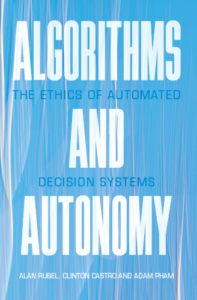Algorithms and ethics
Publication Types:
Algorithms and Autonomy The Ethics of Automated Decision Systems
 Algorithms influence every facet of modern life: criminal justice, education, housing, entertainment, elections, social media, news feeds, work… the list goes on. Delegating important decisions to machines, however, gives rise to deep moral concerns about responsibility, transparency, freedom, fairness, and democracy. Algorithms and Autonomy connects these concerns to the core human value of autonomy in the contexts of algorithmic teacher evaluation, risk assessment in criminal sentencing, predictive policing, background checks, news feeds, ride-sharing platforms, social media, and election interference. Using these case studies, the authors provide a better understanding of machine fairness and algorithmic transparency. They explain why interventions in algorithmic systems are necessary to ensure that algorithms are not used to control citizens’ participation in politics and undercut democracy. This title is also available as Open Access on Cambridge Core.
Algorithms influence every facet of modern life: criminal justice, education, housing, entertainment, elections, social media, news feeds, work… the list goes on. Delegating important decisions to machines, however, gives rise to deep moral concerns about responsibility, transparency, freedom, fairness, and democracy. Algorithms and Autonomy connects these concerns to the core human value of autonomy in the contexts of algorithmic teacher evaluation, risk assessment in criminal sentencing, predictive policing, background checks, news feeds, ride-sharing platforms, social media, and election interference. Using these case studies, the authors provide a better understanding of machine fairness and algorithmic transparency. They explain why interventions in algorithmic systems are necessary to ensure that algorithms are not used to control citizens’ participation in politics and undercut democracy. This title is also available as Open Access on Cambridge Core.
